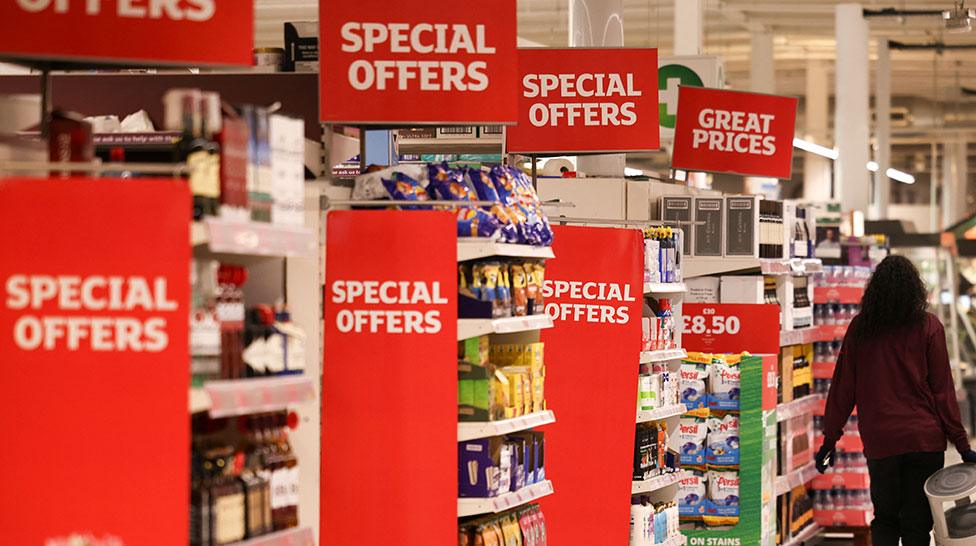Cost of living crisis: Third of Scots cut back spending on essentials
- Published

A third of Scots are cutting back spending on food and other essentials due to the cost of living crisis, according to a new report.
The Fraser of Allander Institute is also warning that Scotland's recovery from the pandemic is starting to falter.
It says rising prices are taking a toll on both companies and consumers.
The think tank says it now expects growth of 0.5% next year, instead of the 1.5% it previously forecast.
In its latest quarterly economic commentary report, the institute said consumers were starting to modify their spending behaviour in response to the ongoing crisis.
More than half reported spending less on non-essential items.
A third said they were spending less on essential items such as food and fuel, while the cost of properties is seeing a significant increase.
It mirrors the findings in a report by the Office for National Statistics which also found half of adults it surveyed said they had bought less food in the last fortnight due to higher prices.
Asda and Tesco have also reported customers cutting back, while Poundland says it has seen a rising number of shoppers as people seek savings.
Analysis by the University of Strathclyde's Fraser of Allander Institute suggests the impact of the cost of living crisis is being experienced in different ways by different demographics, highlighting that consumers of a younger age may feel the increase in property prices and that public transport costs are hitting harder.
Older age groups, it said, are more likely to acknowledge a price rise in food and fuel.
Institute director Prof Mairi Spowage said the data showed the recovery from the pandemic was starting to falter.
"The analysis we have carried out for this quarter's commentary indicates that inflation will be higher and persist for longer than we thought in March," she said.
"This has the potential to limit the economic recovery we hope to see during 2022 and 2023, as consumers cut back on discretionary spending and businesses limit production due to input costs."
She said this had led them to revise down their expectations for growth during 2023.
"Of course economic forecasting is a tricky business at the best of times, but forecasts are highly uncertain right now," she added.
'Changing nature of work'
Angela Mitchell, senior partner at Deloitte, which sponsors the institute's economic commentary, added: "While Scotland's economic recovery was well under way in the first quarter of 2022, challenges for businesses are likely to remain throughout this year as a result of the cost of living pressures driven by both rising inflation and interest rates.
"In this context, the risks posed to future economic growth are in plain sight. Weaker demand, higher costs and, in particular, uncertainty inhibit the likelihood of investment and growth.
"For business leaders, focus must turn to ways to foster productivity which are not solely dependent on the ups and downs of the economic cycle but can be driven by other factors, including prioritising technology, innovation and digital transformation.
"Organisations should consider the changing nature of work and draw on their experiences developed during the pandemic to bolster resilience and ensure a path through the current economic climate."


As prices rise, the tightening of belts by households and business is already leading to a 0.5% fall in output for April, according to Scottish government estimates.
That economic weakness looks likely to continue through much of this year, says the Fraser of Allander Institute.
Expect the second and third quarters to be weak, and the fourth looks like contraction.
While the rate of price increase is expected to subside, albeit with prices remaining at a high level, next year is looking very tough going as well.
Growth of only 0.5% next year implies a high chance of recession - and if not the two consecutive quarters of contraction which is the normal definition, then something that feels very like a downturn.
And so it goes on into 2024, forecast to see the economy grow by an anaemic 1%.
That chimes with the Scottish Fiscal Commission, which sees growth flatlining after this year at only 1%, and cannot see any reason for it to increase over its five-year time horizon.
There is a growing perception that economic growth, measured by Gross Domestic Product, is no way to measure the success of an economy, and instead measures of wellbeing should be more widely adopted.
That may be laudable, but without growth in the economy and without momentum to bring on investment and career prospects, it is hard going for firms and households.
They face expectations of higher taxes to meet demographic change and political pledges. It is also a tough economic backdrop for the independence referendum that the Scottish government wants to see in October 2023.
The Allander's quarterly commentary points out that one way out of this is to step up efforts to tackle poor productivity. So we need to get smarter about the organisation of work, particularly coming out of Covid with the continuation of so much working from home.
Harnessing that change and making it work for employers as well as employees will be an important part of the response to this very challenging decade.
Related topics
- Published17 June 2022

